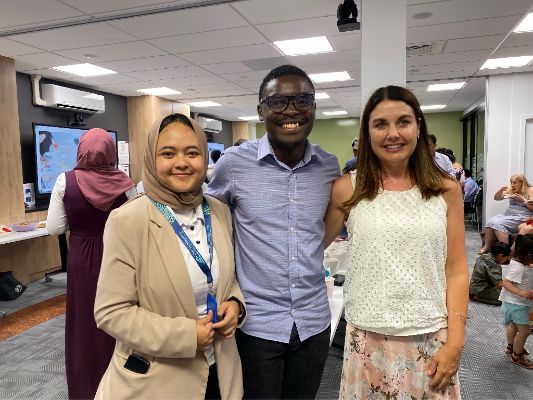New Programme Improving The Health Outcomes Of Migrant And Former Refugee Communities Launches In MidCentral

A new programme aimed at improving the health outcomes of former refugee communities in the MidCentral district was officially launched at a potluck dinner last week. Among an array of cuisines from a wide range of cultures, attendees from partner agencies working in this space were able to hear more about the newly established RIMA Wellbeing programme from THINK Hauora.
The RIMA ((former) refugee, internally displaced person, migrant, and asylum seeker) programme, within the Te Ara Rau Access & Choice service, is being led by Febry Suharto, RIMA Wellbeing Coordinator following research she completed during her Masters’ degree at Massey University. It is run in collaboration with MidCentral DHB and Ora Konnect Alliance.
Febry says: “After moving to Palmerston North from Indonesia, I became involved with the Red Cross Migrant Team as an Intern as well as a Refugee Support Volunteer. My passion for working alongside former refugee communities comes from my background in social work and it soon became clear to me that lots needed to be done to help bridge the gaps for former refugee communities being able to access better healthcare services.”
Febry wanted to understand more about the barriers to access and undertook a research project as part of her Masters’.
“I found the five main barriers for former refugees accessing health services in Palmerston North were language, housing and transportation, cultural misunderstanding, stereotypes and lack of information,” explains Febry.
“Linking up with Louise Chan, Clinical Director of Te Ara Rau Access & Choice at THINK Hauora, we were able to develop a framework by which this programme can make a real difference in our area.”
As well as working to strengthen network connections with providers and agencies, the RIMA programme focuses heavily on ‘bridging health barriers’ – one example being the translation of the Health and Disability Code of Rights into five different languages so far. “I was accompanying people to the hospital and could see this code of rights displayed on the wall, but it was all in English. In collaboration with the community alongside the Health and Disability Commissioner, I plan to translate the document into more languages going forward, including non-written languages such as Rohingya which is an oral-only language,” says Febry.
For communities keen to find out more about the initiatives and support the RIMA programme can provide, Febry has launched a new regular podcast which will cover a range of topics.
“We’ll talk about health information, events that are coming up, hear from people within the RIMA community and explore the range of health resources available in MidCentral. The podcast is a different way of reaching the RIMA communities – anyone can tune in and have a listen.”
Tune into the RIMA podcast and find more information about the programme on the THINK Hauora website.


 Gordon Campbell: On The Left’s Electability Crisis, And The Abundance Ecotopia
Gordon Campbell: On The Left’s Electability Crisis, And The Abundance Ecotopia NZCAST: NZCAST Leads Ongoing Cross-Agency Collaboration To Break Down Barriers For Survivors Of State Abuse
NZCAST: NZCAST Leads Ongoing Cross-Agency Collaboration To Break Down Barriers For Survivors Of State Abuse Regional and Unitary Councils Aotearoa: Regional And Unitary Councils Back A Practical FWFP System
Regional and Unitary Councils Aotearoa: Regional And Unitary Councils Back A Practical FWFP System NZ Government: Stay Safe On Our Roads This Easter
NZ Government: Stay Safe On Our Roads This Easter YWCA: Global Push Back Against Gender Equality A Growing Crisis In Aotearoa
YWCA: Global Push Back Against Gender Equality A Growing Crisis In Aotearoa Te Pāti Māori: Ngarewa-Packer - Fast-Tracking Seabed Mining Ignores Māori Opposition And Environmental Precedent
Te Pāti Māori: Ngarewa-Packer - Fast-Tracking Seabed Mining Ignores Māori Opposition And Environmental Precedent New Zealand Defence Force: Defence And Customs Strengthen Maritime Security With Uncrewed Surface Vessels
New Zealand Defence Force: Defence And Customs Strengthen Maritime Security With Uncrewed Surface Vessels


